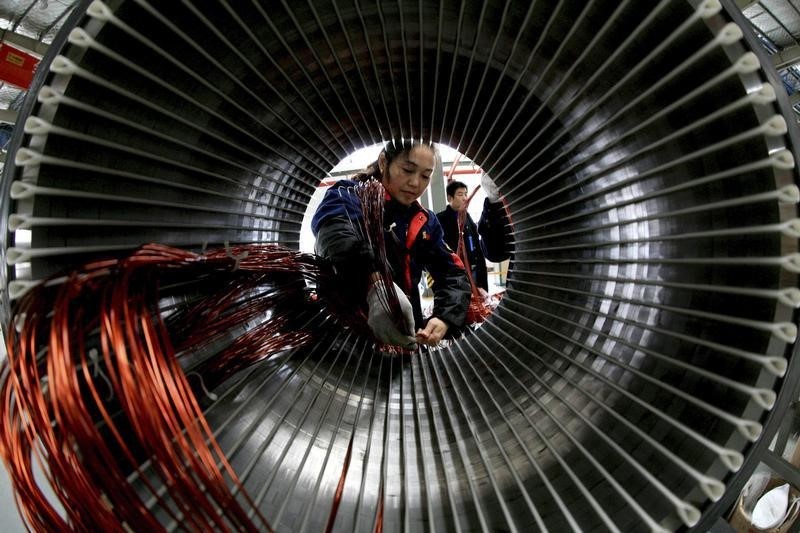(Repeats item published earlier with no change to text. The opinions expressed here are those of the author, a columnist for Reuters.)
By Clyde Russell
LAUNCESTON, Australia, Feb 24 (Reuters) - - If you were to pick one thing that would do the most to help embattled commodity producers around the world, dealing with China's massive over-capacity would probably rank highest.
It's no secret that China's surplus capacity in steel, aluminium, cement, flat glass and other intermediate commodities is keeping prices low and threatening the viability of global resource companies, as well as the health of the Chinese economy.
There certainly have been repeated statements from Beijing that the issues are being tackled, and it appears the authorities have realised that excess capacity is a far bigger threat than what it was during the prior boom years, when double-digit economic growth rates masked mounting problems.
But is China actually doing anything to address the issues, especially in the most affected sectors, such as steel and aluminium?
According to the European Chamber of Commerce in China the answer is a definite no.
"Central government efforts to address excessive production capacity have been ineffectual due to regional protectionism, weak regulatory enforcement, low resource pricing, misdirected investment, inadequate protection of intellectual property rights and an emphasis on market share," the chamber said in a report released this week.
Leaving aside the obvious criticism that the chamber has a powerful self-interest motivation to see China cut capacity, there is fairly strong evidence that the actual rationalisation of capacity is far from what is needed.
China's State Council, the country's cabinet, earlier this month announced plans to cut steel capacity by 100 million to 150 million tonnes within the next five years.
Even if this is achieved, it would be nowhere near enough, given the current surplus capacity is close to 400 million tonnes, about one-third of China's total 1.2 billion tonnes of capability.
The utilisation rate of China's steel mills was about 67 percent last year, down from 80 percent in 2008, and the situation may actually get worse this year, as the China Iron & Steel Association expects additional capacity to be commissioned in 2016.
This suggests that China's steel sector is actually moving in the wrong direction, raising the risks of a brutal shakeout in coming years, rather than a managed process that steadily reduces capacity to levels more aligned with demand.
ALUMINIUM OUTPUT RISING
In aluminium, the risk is also that China sees higher output this year, when what the global market really needs is lower production.
Global output of the energy-intensive metal rose 9 percent last year, but demand increased by about 4 percent, resulting in a build-up in inventories, according to JPMorgan (N:JPM) analysts.
While some Chinese aluminium output was curbed last year, this year it is expected to rise as new projects come onstream in the west of the country.
These ventures enjoy cheaper power costs, the major cost input for aluminium, meaning they will be able to compete, even at depressed prices.
Chinese aluminium production may rise 1.4 million tonnes this year, according to JPMorgan analysts, a significant amount given global output last year was about 57 million tonnes.
What are the implications of China not being able to take effective steps to curb excess capacity?
In the short to medium term it means that prices of beneficiated commodities such as steel and aluminium are likely to remain under pressure, as are the prices of the raw materials from which they are made, such as iron ore, coking coal, bauxite and alumina.
It also means that rallies in prices are likely to be brief and driven by news flow and spot trades, rather than changes in fundamentals.
The almost 20 percent jump in benchmark Shanghai steel rebar futures SRBcv1 from the beginning of the December to Tuesday's close is an example of a rally that appears unlikely to sustain.
The gains have been premised on the hopes of better demand for the post Chinese New Year construction season and of rationalisation in supply.
While there may be a small pick up in demand for building in the second quarter, it appears that loss-making steel mills continue to survive.
Add to this the pressure being placed on China's steel exports from a number of countries implementing, or considering, tariff barriers and it's hard to see how a steel rally can last, unless there is actual evidence of rationalisation at mills.
This means the gains in spot iron ore .IO62-CNI=SI , which has jumped 28 percent since Jan. 13 when prices fell to their lowest in 2016 to a four-month high of $50.50 a tonne, is also likely built on shaky ground.
Longer term, the risks of a severe adjustment in China's commodities sectors become higher the longer effective action is delayed.
The question policymakers in Beijing need to answer is what is the least painful, but effective, solution to overcapacity.
All of them come with costs and challenges.
A market-based solution, allowing those that can't compete to go out of business, will result in large-scale job losses and debt problems at local and regional governments, which will likely be exacerbated as these authorities borrow more in efforts to keep loss-making plants open.
The best solution is probably one that incentivises the closure of loss-making steel mills and smelters by providing alternative, service-based industries as replacements for labour, coupled with measured debt relief.
Beijing has been kicking the excess capacity can down the road for at least the past five years, but as the Japanese found with their asset bubble in the late Eighties and the Europeans are starting to realise with Greece, problems can't be shunted along forever.
"A little less conversation, a little more action please. All this aggravation ain't satisfactioning me," sang the late Elvis Presley. Leaving aside the dubious verb construction, the Chinese should listen to the king.
(Editing by Christian Schmollinger)
